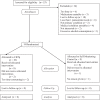Transdiagnostic cognitive behavioral therapy for nightmares and parasomnias
- PMID: 36468650
- PMCID: PMC9978420
- DOI: 10.5664/jcsm.10374
Transdiagnostic cognitive behavioral therapy for nightmares and parasomnias
Abstract
Study objectives: This pilot study determined whether transdiagnostic cognitive behavioral therapy for parasomnias (CBTp) reduces parasomnia and activity levels during sleep in a sample of adult sleep clinic outpatients. A secondary objective was to assess whether treatment produces improvements in daytime fatigue/sleepiness, perceived cognition, mood, and depression/anxiety/stress, as well as functional impairment in work and leisure activities.
Methods: This was a randomized controlled trial with CBTp and self-monitoring control conditions. Participants were 19 adults with a DSM 5 parasomnia disorder who received individual CBTp virtually from their homes. CBTp consisted of psychoeducation, sleep hygiene and safety instructions, relaxation training, parasomnia techniques, and relapse prevention in a 6-week manualized, structured program.
Results: Using a repeated measures analysis of variance model, and relative to a self-monitoring control condition, results showed that CBTp produced statistically significant improvements in parasomnia frequency, severity, nocturnal activity, and sleep efficiency. There was a trend toward reduced sleep-onset latency and improved work and social adjustment. Of treated participants, 100% rated themselves as improved at study conclusion.
Conclusions: Implications of these findings are that cognitive behavioral interventions for parasomnias are effective in lessening parasomnias. More investigation into this type of treatment is warranted.
Clinical trial registration: Registry: ClinicalTrials.gov; Name: Impact of Cognitive Behavioral Therapy on Parasomnias; URL: https://clinicaltrials.gov/ct2/show/NCT04633668; Identifier: NCT04633668.
Citation: Vincent N, Dirkse D, Giannouli E, McQuarrie A. Transdiagnostic cognitive behavioral therapy for nightmares and parasomnias. J Clin Sleep Med. 2023;19(3):499-509.
Keywords: cognitive behavioral treatment; parasomnia.
© 2023 American Academy of Sleep Medicine.
Conflict of interest statement
All authors have read and approved the manuscript. Work for this study was performed at the University of Manitoba. This study was funded by an internal grant from the Max Rady College of Medicine, University of Manitoba. The authors report no conflicts of interest.
Figures
Similar articles
-
A randomized controlled trial of cognitive behavioral therapy for insomnia and PAP for obstructive sleep apnea and comorbid insomnia: effects on nocturnal sleep and daytime performance.J Clin Sleep Med. 2022 Mar 1;18(3):789-800. doi: 10.5664/jcsm.9696. J Clin Sleep Med. 2022. PMID: 34648425 Free PMC article. Clinical Trial.
-
Self-reported sleep problems in active-duty US Army personnel receiving posttraumatic stress disorder treatment in group or individual formats: secondary analysis of a randomized clinical trial.J Clin Sleep Med. 2023 Aug 1;19(8):1389-1398. doi: 10.5664/jcsm.10584. J Clin Sleep Med. 2023. PMID: 36988304 Free PMC article. Clinical Trial.
-
Brief behavioral treatment for insomnia decreases trauma-related nightmare frequency in veterans.J Clin Sleep Med. 2022 Jul 1;18(7):1831-1839. doi: 10.5664/jcsm.10002. J Clin Sleep Med. 2022. PMID: 35393934 Free PMC article. Clinical Trial.
-
Parasomnias of childhood.Curr Opin Pediatr. 2008 Dec;20(6):659-65. doi: 10.1097/MOP.0b013e328316bd9d. Curr Opin Pediatr. 2008. PMID: 19005335 Review.
-
Trauma-Associated Sleep Disorder.Sleep Med Clin. 2024 Mar;19(1):93-99. doi: 10.1016/j.jsmc.2023.10.005. Epub 2023 Nov 23. Sleep Med Clin. 2024. PMID: 38368073 Review.
Cited by
-
Behavioral and psychological treatments for NREM parasomnias: A systematic review.Sleep Med. 2023 Nov;111:36-53. doi: 10.1016/j.sleep.2023.09.004. Epub 2023 Sep 6. Sleep Med. 2023. PMID: 37716336 Free PMC article.
-
Diagnosis and Management of NREM Sleep Parasomnias in Children and Adults.Diagnostics (Basel). 2023 Mar 27;13(7):1261. doi: 10.3390/diagnostics13071261. Diagnostics (Basel). 2023. PMID: 37046480 Free PMC article. Review.
References
-
- American Psychiatric Association . Diagnostic and Statistical Manual of Mental Disorders. 5th ed. Washington, DC: : American Psychiatric Association; ; 2013. .
-
- Bjorvatn B , Grønli J , Pallesen S . Prevalence of different parasomnias in the general population . Sleep Med. 2010. ; 11 ( 10 ): 1031 – 1034 . - PubMed
-
- Germain A , Nielsen TA . Sleep pathophysiology in posttraumatic stress disorder and idiopathic nightmare sufferers . Biol Psychiatry. 2003. ; 54 ( 10 ): 1092 – 1098 . - PubMed
-
- Hedström AK , Bellocco R , Hössjer O , Ye W , Trolle Lagerros Y , Åkerstedt T . The relationship between nightmares, depression and suicide . Sleep Med. 2021. ; 77 : 1 – 6 . - PubMed
Publication types
MeSH terms
Associated data
LinkOut - more resources
Full Text Sources
Medical


